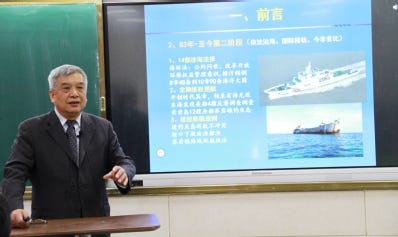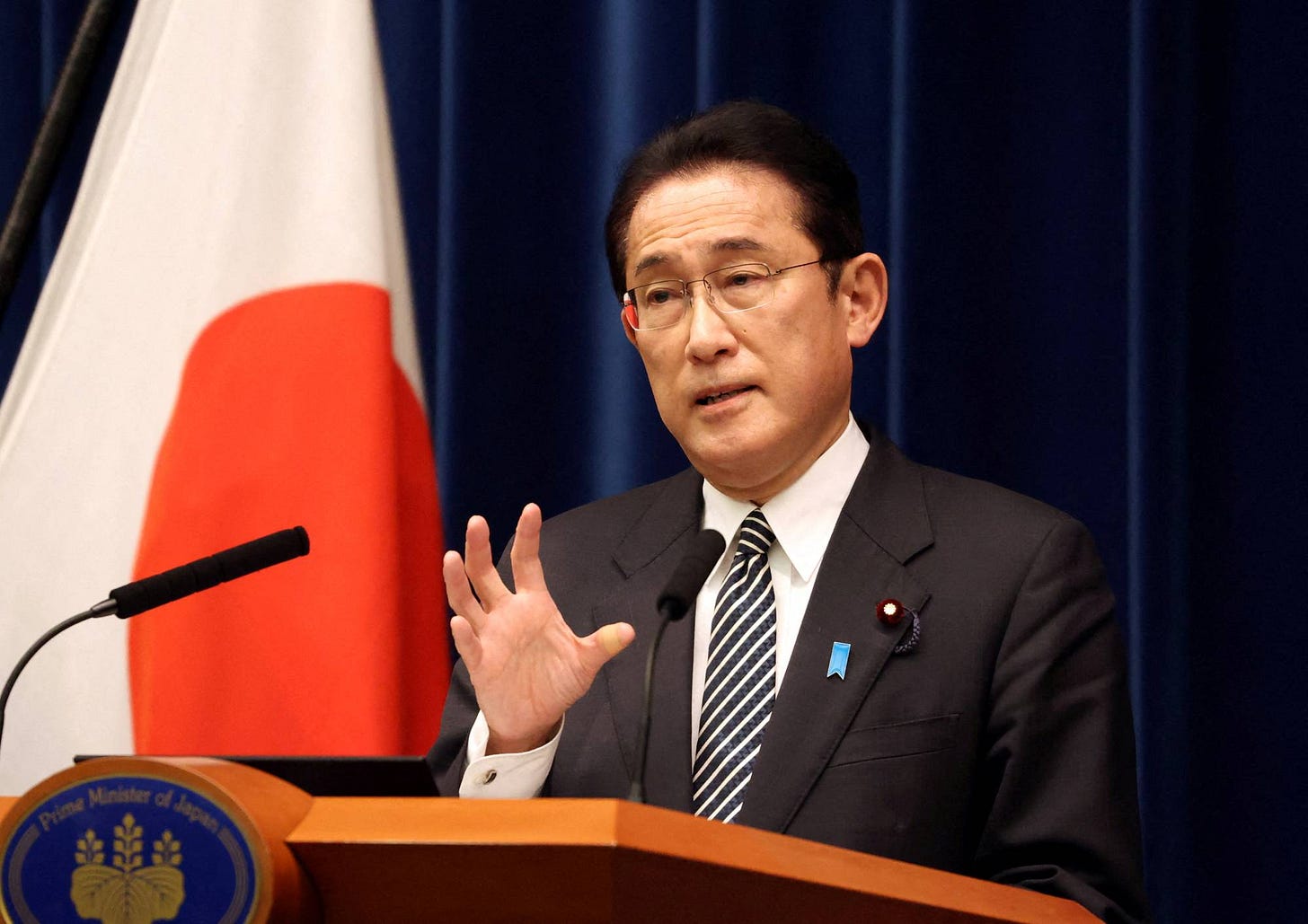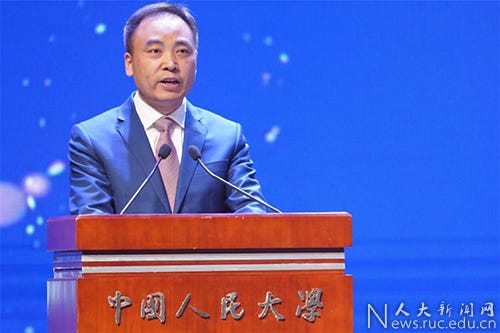Discourse Power | May 4, 2022
Terrorism in Pakistan, militarism in Japan, and utopianism in China
Dear readers,
Today is May 4th, which the PRC has designated as "Youth Day." To learn more about its historical and symbolic significance, read Prof. James Carter's short essay for SupChina.
One reader pointed at the lack of diversity in the previous issues of this newsletter. Unfortunately, I had to agree; Chinese intellectual and academic circles, like China's leadership, are heavily underrepresented in favor of men, and rarely do you find female commentators on top platforms, save from the occasional Fu Yings and Chen Wenlings.
If you come across any interesting commentaries by female pundits, please send them my way and I'll try to include them in future issues.
Thank you for reading,
Tuvia
“If the information provided by Pakistani intelligence is correct, then the ongoing terrorist activities in Pakistan, particularly terrorism targeting Chinese nationals, are, based on their assessment, a proxy war in which Indian and US backing cannot be ruled out”
Dr. Liu Zongyi, Secretary-General of the South Asia and China Center at the Shanghai Institutes for International Studies (SIIS), addresses how China should respond to last week's terror attack in Pakistan that killed three Chinese citizens.
“First and foremost, China and Pakistan have traditionally had close counter-terrorism cooperation... However, I am very much against Chinese forces entering Pakistani territory to conduct operations against local terrorist organizations.
“It's a different story if China is providing support in the form of weapons systems or technology. Nonetheless, due to the complexities of Pakistan's internal affairs, counter-terrorism operations should be primarily carried out by the Pakistani military and police.
“Second, the building of the China-Pakistan Economic Corridor (CPEC) does, in fact, necessitate a peaceful and stable regional security environment, therefore we need not just China-Pakistan cooperation, but also regional cooperation on this issue.
“Third, in terms of the security of the CPEC, we are now in a dilemma: Pakistan has set up a 15,000-strong dedicated police force to protect the construction of the CPEC and the safety of Chinese engineers and workers. This has worked well in general, but there are some downsides. For one thing, it places a financial burden on both Pakistan and China. For another, while the security keeps us Chinese safe, it also isolates us from the local population... which could lead to a sense of estrangement and misunderstandings.
“A political solution is needed to address the issue of terrorism in Pakistan, particularly in relation to the CPEC. Furthermore, given the suicide attacker's family background (two master's degrees and a supportive middle-class family), if she truly volunteered and was not coerced into committing this attack, the Pakistani government should seriously consider how to better appease the middle class in Balochistan and throughout Pakistan, and how to better protect their interests in the process of economic and social development.
“Finally, in order to effectively combat terrorism in Pakistan, it is necessary to sever all ties with terrorists' supporters outside the country. If the information provided by Pakistani intelligence is correct, then the ongoing terrorist activities in Pakistan, particularly terrorism targeting Chinese nationals, are, based on their assessment, a proxy war in which Indian and US backing cannot be ruled out.” (SIIS)
"The frequency and sophistication of Japan's ‘salami-slicing’ activities to establish de facto control over the Diaoyu Islands and surrounding waters will increase in the future"
Yu Zhirong, a retired PLA Navy officer and a career Japan scholar, published a brief analysis of the current Sino-Japanese island dispute in light of the Russia-Ukraine conflict.
Yu notes that Japan followed the US in imposing all-around sanctions on Russia, and its military aided Ukraine in fighting the Russian army. He adds that on April 22, Japan published its Diplomatic Bluebook [sic], in which it strongly condemned Russia for undermining the international order's foundations. It also claimed that the four southernmost Kuril Islands, which the Soviet Union annexed at the end of WWII, are inherent Japanese territory that Russia had illegally occupied.
Yu recounts recent developments in and procurement of Japanese weaponry that can be deployed at sea, such as General Atomics' MQ-9B SeaGuardian UAV, which is expected to go into service of the Japanese Coast Guard later this year.
Yu cautions that Japan already considers the China Coast Guard as being part of the PLA to all intents and purposes. He expects Japan to continue what China sees as "salami slicing" measures in the disputed Diaoyu/Senkaku Islands and their waters, and that these actions will become more frequent in the future.
"We must be especially vigilant to prevent Japanese right-wingers from exploiting the ‘Four Northern Islands’ dispute [between Japan and Russia] and the Dokdo/Takeshima dispute [between Japan and Korea]”, Yu concludes, adding that China “should also plan and implement various initiatives to protect our sovereignty over the Diaoyu Islands, such as building fishing piers, installing light beacons, and conducting environmental surveys around the islands." (Huayu Think-Tank)
“Since the start of the Russia-Ukraine conflict, Japan has followed the US and Europe's lead in imposing unprecedentedly harsh sanctions on Russia and breaking the post-World War II barrier by providing military aid to Ukraine. This reflects Japan's growing ideological entanglement with Europe and the US, as well as its determination to preserve the US-led Western-dominated international order”
Dr. Xiang Haoyu of the China Institute of International Studies (CIIS), a professional research institute directly administered by the People's Republic of China Ministry of Foreign Affairs, writes about the calculations and costs of Japan's “assertive approach” to Russia.
Excerpts:
“The Russia-Ukraine conflict presents a new opportunity for Japan's right-wing conservative forces to promote the 'national normalization' process. It also demonstrates several new trends in the evolution of Japan's national security concept and strategy:
“First, an ideological "binding" to the United States and Europe. A poll conducted in early March found that as many as 82 percent of respondents supported economic sanctions against Russia, and 81 percent believed that the Russia-Ukraine conflict would have spillover effects that would jeopardize Japan's national security.
“The second is that public opinion is becoming increasingly 'desensitized' to military affairs. At the graduation ceremony of the Japan Defense University on March 27, Prime Minister Kishida stated that the Russia-Ukraine conflict 'could evolve into the world's and Japan's biggest crisis since World War II,' and that 'Japan cannot rule out any options and needs to fundamentally strengthen its defense forces.'
“Domestic debate in Japan has shifted to the revision of the country's Peace Constitution and the development of self-defense capabilities. The announcement by Germany to increase defense spending and create a €100 billion Armed Forces Special Fund, in particular, has given conservative elements in Japan a new impetus.
“The Kishida administration has stated that the revision of the National Security Strategy (NSS) and the National Defense Program Guidelines (NDPG) will be completed this year and that it will increase defense spending and focus on offensive combat capabilities, including the development of 'attack capabilities against enemy bases.' In a poll conducted at the end of March, 64 percent of respondents supported Japan's 'enhanced defense capabilities,' far outnumbering the 27 percent who opposed it.
“The third is the search for 'security and safeguards' beyond national borders, with the goal of bolstering the Japan-US military alliance and deepening security cooperation in the 'Indo-Pacific.' Although Shinzo Abe's comments about 'hosting US nuclear weapons' were later clarified by officials, they were met with some approval and follow-up. The Japanese government gave Ukraine $100 million in 'humanitarian aid,' including bulletproof vests, helmets, and other military gear, in what was seen as a veiled violation of Japan's Three Principles on Transfer of Defense Equipment and Technology.
“Fourth, Taiwan-related negative trends have become more prominent. On the one hand, some Japanese people believe that as a result of Western sanctions, Russia has become more reliant on China and that the strategic relationship between the two countries will deepen. Japan, on the other hand, is concerned about the impact of the Ukraine crisis on the Taiwan question. Kishida claimed in a parliamentary questioning that he was 'concerned about the impact (of the Russian-Ukrainian conflict) on the situation in the Taiwan Strait'. Some politicians and the media openly compared Ukraine to Taiwan and speculated on the dangers in the Taiwan Strait, claiming that 'Taiwan's problems are Japan's problems,' exaggerating the threat and advocating for stronger military measures against China.” (Intellisia)
“Taking advantage of the Ukrainian crisis to beef up its military and expand its forces? Japan's recent trends call for caution”
Some political forces in Japan have attempted to "rationalize" the case for military build-up since the outbreak of the conflict between Russia and Ukraine, according to the overseas edition of People's Daily, the Party mouthpiece, which “warrants a high degree of caution from neighboring countries and the international community.”
Excerpts:
“When compared to last year's issue, this year's Diplomatic Bluebook reflects a more cautious Japanese approach to China and a tougher approach to Russia. The Bluebook acknowledges that 'establishing a constructive and stable Japan-China relationship is critical,' but falsely claims that China 'attempts to unilaterally change the status quo in the East China Sea and the South China Sea.'
“The Bluebook's so-called 'threat theory' about China and Russia is actually Japan's latest attempt to exploit chaos... Former Japanese Prime Minister Shinzo Abe wrote an article for the Los Angeles Times in which he compared the Russian-Ukrainian conflict to the Taiwan issue and urged the US to 'abandon its strategic ambiguity towards Taiwan.' In the final analysis, Japan is actually attempting to use the conflict between Russia and Ukraine to accelerate the development of its military power.
“In recent years, Japan has taken small steps toward developing its armed forces while arbitrary labeling other countries as 'threats.' In reality, Japan is only using it as a pretext to break through the limitations of its Peace Constitution, allowing it to develop its armaments and revealing that it is Japan itself that truly affects the region's and the world's peace and stability.
“May 3 will mark the 75th anniversary of the adoption of Japan's post-war Peace Constitution. Japan should take this opportunity to reflect on how to put its spirit into action, how to contribute positively to regional peace and stability, and how to earn the respect and trust of neighboring countries and regions, instead of doing the exact opposite.” (Haiwaiwang)
“The vast majority of China's youth should make a concerted effort to become firm believers in Xi Jinping's Thought on Socialism with Chinese Characteristics for a New Era, active propagators, and exemplary practitioners”
Professor Du Huanfang on how China can cultivate the New Man of our generation 时代新人 capable of bearing the burden of national rejuvenation. Du is a professor and party secretary at Renmin University of China's Law School, as well as a researcher at the Xi Jinping Thought on Socialism with Chinese Characteristics for a New Era Research Institute. (Chinese Social Sciences Net)
Context: General Secretary Xi Jinping paid a visit to Renmin University of China last Monday, in preparation for today's 103rd anniversary of the May Fourth Movement and this year's 100th anniversary of the founding of the Communist Youth League. During his visit, he highlighted the critical role played by the Chinese youth in the realization of the great rejuvenation of the Chinese nation in the New Era.
A week earlier, the State Council Information Office had published a white paper titled the Youth of China in the New Era, using a notable historical framing:
“After 1840, China was gradually reduced to a semi-colonial, semi-feudal society and suffered enormous hardships. The country endured intense humiliation, the people were subjected to great pain, and China's civilization was plunged into darkness. China's youth gradually came to recognize the mounting national crisis.
“The enlightenment of its youth lit a beacon of hope for the rejuvenation of the Chinese nation. Around the May Fourth Movement in 1919, a large number of aspiring and progressive young intellectuals assumed the lead in accepting new ideas, new culture, and new knowledge. After careful consideration, they chose to follow Marxism-Leninism, which led to a widespread awakening of the people and the nation for the first time since the Opium War…
“Looking back on a century of relentless change, China's youth have never wavered in their determination to love the Party, the country, and the people, nor in their commitment to the original aspiration of following the instructions and guidance of the Party.”
Playing in the Background
Today is Israel's Fallen Soldiers and Victims of Hostile Acts Memorial Day, on which we remember family and friends whose sacrifice is the silver platter on which the state has been handed to us.
I'm Missing You Here / Aviv Geffen
When you left here, you didn't know where
you framed my face in your window.
But also in pictures, sometimes the figures
can hear the ticking of clocks in the air.
Discourse Power is written by Tuvia Gering, a research fellow at the Jerusalem Institute for Strategy and Security and a Krauthammer Fellow, specializing in Chinese security and foreign policy, and emergency and disaster management. Any views expressed in this newsletter, as well as any errors, are solely those of the author.
Follow Tuvia on Twitter @GeringTuvia










In terms of acknowledged casualties, 20 Indians died as against 4 Chinese. So who cudgelled who to death is a moot question.
Why did CCTV find it appropriate to show images from the 2020 Galwan River clash?
Because Chinese soldiers allowed themselves to be cudgeled to death rather than kill their adversaries or yield to India's incessant efforts to stir up trouble on the Indo-Chinese border, as it has done on every one of its international borders.